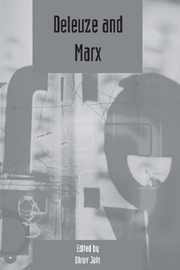Book contents
- Frontmatter
- Contents
- Editor's Introduction
- Articles
- Deleuze, Marx and the Politicisation of Philosophy
- The Marx of Anti-Oedipus
- Marx as Ally: Deleuze outside Marxism, Adjacent Marx
- The Fetish is Always Actual, Revolution is Always Virtual: From Noology to Noopolitics
- Minor Marxism: An Approach to a New Political Praxis
- Politicising Deleuzian Thought, or, Minority's Position within Marxism
- Review Essay
The Marx of Anti-Oedipus
from Articles
Published online by Cambridge University Press: 12 September 2012
- Frontmatter
- Contents
- Editor's Introduction
- Articles
- Deleuze, Marx and the Politicisation of Philosophy
- The Marx of Anti-Oedipus
- Marx as Ally: Deleuze outside Marxism, Adjacent Marx
- The Fetish is Always Actual, Revolution is Always Virtual: From Noology to Noopolitics
- Minor Marxism: An Approach to a New Political Praxis
- Politicising Deleuzian Thought, or, Minority's Position within Marxism
- Review Essay
Summary
Abstract
The meeting of Deleuze and Guattari in 1969 is generally used to explain how the former's thought became politicised under the influence of the latter. This narrative, however useful it might be in explaining Deleuze's move away from the domain of academic philosophy following the upheavals of May 1968, has had the effect of de-emphasising the conceptual development which occurred between Difference and Repetition and Anti-Oedipus. Worst of all, it has had the effect of reducing the role of Marx's philosophy to the superficial level of political alibi, impoverishing our understanding of its importance with respect to the conceptual assemblage of Anti-Oedipus. This paper attempts to restore Marx's relevance to Deleuze and Guattari's project by understanding Anti-Oedipus through the Marxian categories of production, distribution, surplus-value and consumption, and argues for a conception of schizoanalysis which does not relegate the name of Marx to the garbage heap of poststructuralist intellectual strategy.
Keywords: Marx, Anti-Oedipus, capital, production, surplus, distribution, consumption, ideology
The story of the meeting of Deleuze and Guattari in the summer of ’69 has attained something of a mythological status. The reason for this is clear: Anti-Oedipus is one of the most important and controversial intellectual responses to the political tumult of May ‘68. The accepted version of the ‘origin myth’ suggests that Deleuze, the respectable professor, needed the sense of political urgency which Guattari offered, while Guattari, the lifelong activist, needed the theoretical grounding which Deleuze provided (Holland 1999: vii).
- Type
- Chapter
- Information
- Deleuze and MarxDeleuze Studies 2009 (Supplement), pp. 28 - 52Publisher: Edinburgh University PressPrint publication year: 2010



